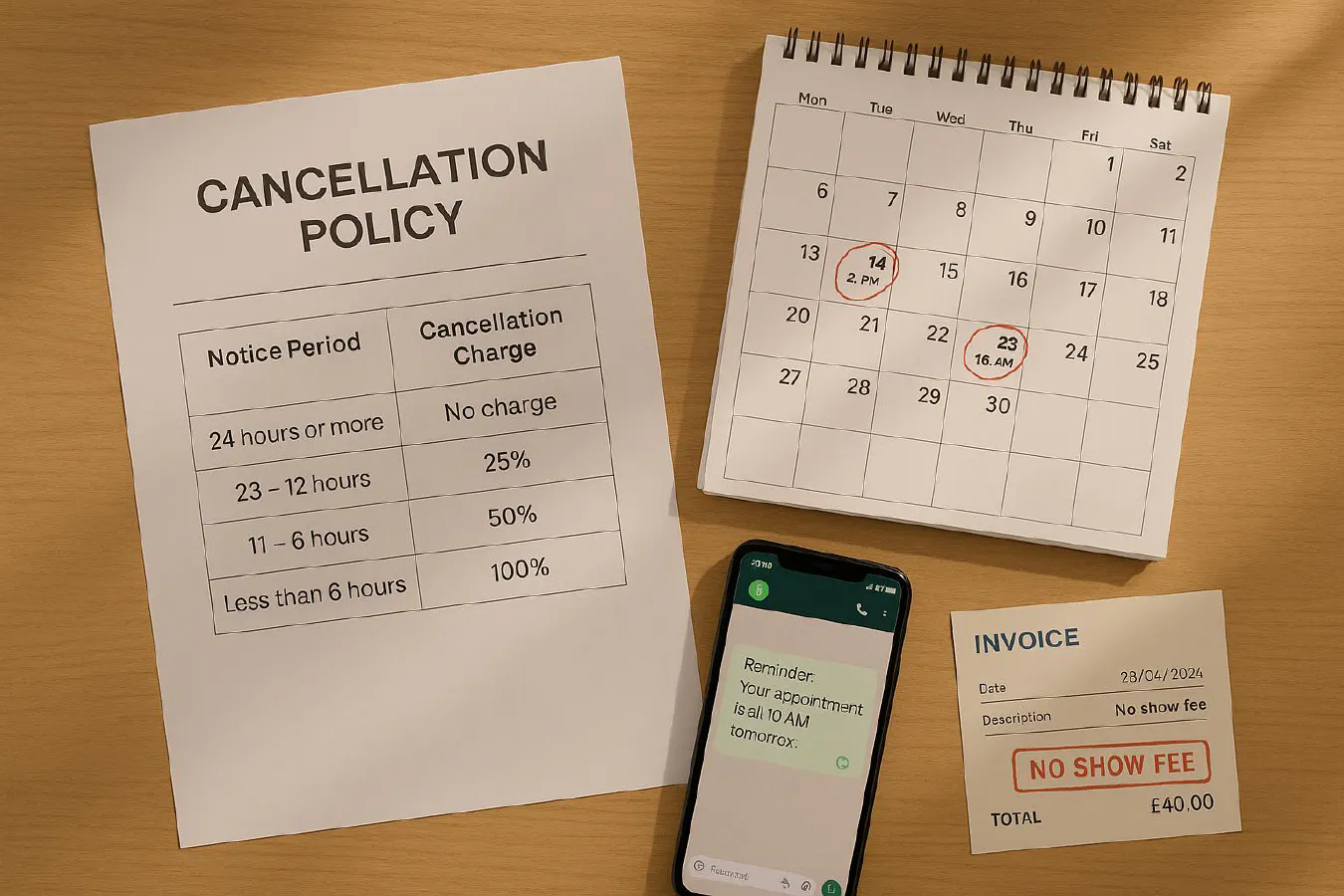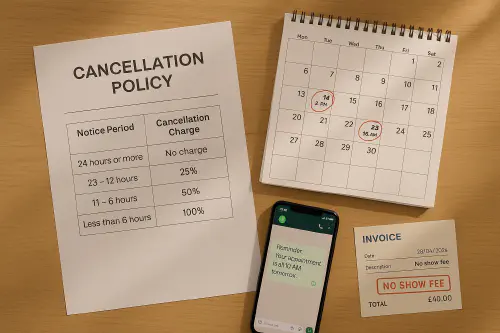
No-show fees and cancellation policy for trades: UK-legal wording, sliding scales and automated reminders
Jump To...

Desk with cancellation policy, calendar, WhatsApp reminder and a small invoice marked no show fee
Quick answer
- Yes, you can charge a no-show or cancellation fee to domestic customers, but it must be fair, clearly disclosed up front, and limited to your genuine losses. Heavy-handed “no refunds for any reason” terms are risky.
- For distance/off‑premises bookings (phone/online, or at a customer’s home), the Consumer Contracts Regulations usually give 14 days to cancel unless the customer asked you to start sooner, in which case you can charge a proportionate amount for work already delivered.
- A simple sliding scale can work if you can justify it with evidence (hard costs, time spent, lost chance to re‑book) and you reduce/waive it if you re‑sell the slot.
Useful references: CMA unfair terms guidance (CMA37), CMA statement on cancellations and refunds and the Consumer Contracts Regulations 2013.
What UK law actually allows
- Fairness test: terms must be fair, transparent and prominent under the Consumer Rights Act 2015 and CMA guidance. Unfair terms aren’t binding.
- Charges must reflect actual loss, not be a penalty. Credit any savings (materials not bought) and any re‑booking income. No double recovery.
- 14‑day cooling‑off for distance/off‑premises service contracts. If you start within 14 days with express request, the customer pays a proportionate amount for work performed up to cancellation. If you didn’t give the required information/consent, you may not be able to charge during the cooling‑off period.
- Misleading “non‑refundable” claims or aggressive practices can breach unfair commercial practices law. See CMA207 unfair commercial practices.
Customer-friendly source for context: Citizens Advice on cancelling a service.
Pick a fair, defensible fee structure
Work through your real costs and typical losses, then pick one of these patterns and keep evidence to back it up.
- Simple call‑out reservation fee (for diagnostics/first visit): a modest non‑refundable amount that truly reflects booking/admin and travel prep. Convert it to labour on attendance.
- Sliding scale for planned jobs: deposit only if cancelled >30 days; up to 25 to 40 percent if 30 to 7 days; up to 50 to 75 percent inside 7 days. Only charge what you can justify, and reduce if you re‑book.
- Proportionate charge during cooling‑off: for phone/online bookings where the customer asked you to start within 14 days, charge only for work actually done and costs incurred.
Tip: log failed appointments and re‑sales in a simple sheet so you can show how you mitigated loss.
Model wording you can adapt
Use plain English. Put this on your quotes, booking confirmation and website. Draw attention to it before they accept.
- Cooling‑off for distance/off‑premises bookings: “If you book with us by phone/online or at your home, you’ve 14 days to cancel. If you ask us to start sooner, you’ll pay a proportionate amount for the work we’ve already done and any costs we can’t recover.”
- Deposit: “We take a non‑refundable deposit of £[amount or %] to reserve your date. It covers booking/admin time only. It isn’t a penalty and will be deducted from your final bill.”
- Cancellations and no‑shows: “If you cancel after the cooling‑off period or don’t attend/allow access, we charge the lower of (a) our genuine direct loss (unrecoverable costs, time already spent, any net lost profit if we can’t re‑book) minus any savings and re‑booking income; or (b) this cap:
- More than 30 days’ notice: deposit only
- 30 to 7 days’ notice: up to [25–40]% of the total
- Less than 7 days’ notice or no‑show: up to [50–75]% of the total We will reduce or waive the charge if we re‑book the slot.”
- No double recovery: “We won’t keep an advance payment and also charge a fee for the same loss.”
- Access requirements: “You must ensure safe access and someone on site. If we can’t gain access after reasonable attempts, it may be treated as a no‑show.”
Automated reminders that cut no-shows
You’ll recover more by preventing missed appointments than by charging fees. Here’s a quick stack using tools many trades already use.
- Google Calendar reminders: send a reminder 24 hours and 2 hours before the visit. Include date/time, access instructions, and a reschedule link.
- WhatsApp templates: use short, friendly messages. See our guides: WhatsApp appointment reminders for trades and How to add WhatsApp and Text buttons to Google Business Profile.
- Payment links on confirmation: reduce cancellations by taking a small reservation fee or deposit up front. See: Auto‑collect deposits when a quote is accepted and WhatsApp payment reminders for trades.
- Missed‑call text‑back: if a customer rings and you miss it, auto‑text back with a booking link. See: Call tracking for trades.
Example reminder wording
- 24 hours before: “Hi [Name], your appointment is tomorrow [date] at [time]. Please make sure someone is in and there’s access. Need to reschedule? Tap here: [link].”
- 2 hours before: “On our way for [time]. If access is a problem, please reply now. No‑show fees may apply per our booking terms: [link].”
How to take deposits correctly
- Keep deposits modest and linked to real reservation/admin costs. For small jobs 10 to 20 percent is common; for bigger projects, use staged payments tied to materials ordered or off‑site prep.
- Make it clear deposits are deducted from the final bill and are not a penalty. If you cancel, refund swiftly.
- For distance/off‑premises bookings inside 14 days, only keep a proportion that covers what you’ve already supplied, if the customer asked you to start sooner.
Further reading: Deposits, staged payments and progress invoices for building jobs.
How to handle disputes
- Keep records: messages, call logs, diary entries, GPS/time‑stamped photos if you attended. This evidence helps justify any charge.
- Be reasonable: offer a smaller “second chance” fee or re‑book at no cost if they give you another job quickly.
- Signpost ADR: mention you’re happy to use an approved ADR scheme if you can’t agree. Avoid aggressive wording.
- For home improvements and planned works, point customers to your written policy at quote stage and in your confirmation email.
Useful sources: CMA unfair terms guide, Citizens Advice: cancelling building or decorating work.
FAQs
- Can I charge a no‑show fee if I never confirmed the booking? Generally no. You need a clear contract/acceptance and terms shown up front.
- Can I charge travel time if they cancel on the doorstep? Yes if it’s in your terms and reflects real loss. Keep proof of attendance.
- Do cooling‑off rules always apply? No. On‑premises sales (agreed at your yard/office) aren’t covered. Distance/off‑premises are, with exceptions.
- Can I keep the whole deposit if they cancel? Only if it reflects your actual loss. If you re‑book the slot or avoid costs, reduce the amount.
- Are SMS/WhatsApp reminders allowed under PECR/GDPR? Yes for service messages to existing bookings. For marketing, you need consent/soft opt‑in. Include opt‑out wording like “Reply STOP to opt out of reminders”.
Ready to Transform Your Business?
Turn every engineer into your best engineer and solve recruitment bottlenecks
Join the TrainAR Waitlist